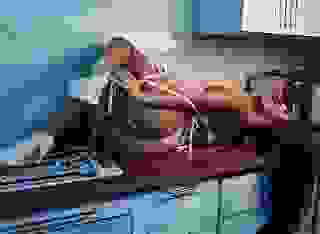Note: You can change font size, font face, and turn on dark mode by clicking the "A" icon tab in the Story Info Box.
You can temporarily switch back to a Classic Literotica® experience during our ongoing public Beta testing. Please consider leaving feedback on issues you experience or suggest improvements.
Click hereI avoided details about my impending divorce, nor did I tell him about my part in the shootings.
June ended and July came in hotter than ever. Our air conditioning was stalwart but upstairs I needed a fan overnight to sleep; it was comfortable with that. I went back to work at regular hours, and the second week of July Father Michales came in to talk about my job.
*
He sat across from me. "You know, I've been looking at ways we can keep you at the hospital. I mean, it's tragic to lose good people because of lack of a strong career pathway in a growing hospital. John, if you're interested, I'd like to propose some ideas to the board. If you're interested," he said. I was touched. He was going out of his way to help me. He acted as if I had options.
"I'd like to send you to a program in Cleveland for new hospital administrators, where they will teach you about all the licensing, accrediting, and certifying rules for the various major medical fields. I understand they include some work on hospital and doctor contracts. They have connections to programs all over the world.
"Sending a doctor off to be trained shouldn't, should NOT cost our hospital the benefit of the training. Hopefully, once you get back here we can set up a program to help the doctors identify their deficiencies and strengths; we can then include nurses and other professions. We need to build upgrading and relicensing into our professionals' contracts, so they don't go away and stay there. I want the best of our doctors to want to stay here, for their families to stay in Sky Grey. That idea took a big hit with the massacre." He shook his head. I realized he expected to fight to prove Sky Grey was a good place to raise a family.
He went on. "The program will get you some graduate credits. Once you finish in Cleveland, I'd like you to begin a course in health admin or hospital management; there are several around that I think would help. Or one in hospital law, not malpractice, hospital. Maybe a sabbatical down the road, for a master's."
"You want me to work toward a degree, Father?" I asked.
"I do. You'll have some choices to make if you want the career here at Merciful God. As we start a new department. I don't see how one person could do it. Bigger hospitals have a department to help the doctors and nurses maintain or improve their ratings; I've seen some. We'd have to add an assistant once your initial training was over and you were attempting to establish a program. Then one or two more, within a short time. I could help you with all of this, but some of it would be similar to what you have been doing, but of course on a much more rigorous basis. We'll arrange for you to finish a program in hospital management or personnel, or a related field like law. Hell, a law degree makes sense."
I'd never been excited about my job before.
"Next step is writing it up. Could you get me started, investigate University Hospital in Cincinnati; they have a huge number of doctors and first-rate facilities and reputation. Find out how they do it, get me some notes and then a short essay about all the elements. Notes don't have to be fancy or perfect, but make the essays good; I may want to use them when I talk to the board. Maybe a week for the first. If you need more time, let me know. You'll have to meet up with them, interview people. Okay?"
I was smiling. "Yes, sir, I'll call as soon as you leave here."
"Notes first, I want to see what you're running into. Every day you can send them to me by email, or paper, as often as you can. I can give you some help with phone calls."
I looked at him and considered his purposes. I was sure he knew what this sort of job entailed. It sounded like some of the lines I'd read in his vita, positions he'd held at other hospitals early in his career. He was training me, sending me to investigate things he already knew, making sure I learned how such a professional human resources department worked. Apparently, he had faith in my abilities and wanted to marshal me along into a career. "Great, sir. I know some people in that department at UC, I'll call them right away and see what they think."
So my new job began. I was excited and scared I might be in over my head. I would have been, but there were several people holding me up.
*
I had my hand examined another time by good Dr. Beatol, who pronounced it much improved and one of her best jobs. She said I should continue to wrap it for the rest of the summer. She also had some ointment to help healing and prevent infections. The scars were vicious looking and made me wonder if I'd ever be able to make a fist. As it was, I could move all my fingers with some pain.
Weeks and then a month had passed since the shooting, and hot day followed hot night. I didn't see the children; I didn't see Karen Ann. Life was comfortable but empty for me. Anonymity suited me like a glove, but without children or wife, I was lonely in ways no friendly priest could assuage. Indeed, I'd always been anonymous. Except for two Homeland investigators and the two priests, I didn't think anyone knew where I lived, not even my parents.
There was great conjecture in the media still about who had killed the terrorists. The shadowy Youtube cellphone video was brightened and enhanced to the point I thought I could recognize me, but I didn't think anyone else could. No one had ever considered me in such a role, so that aided my anonymity. The one thing it showed clearly was the effect of the round hitting my right hand. Luckily, I was just one of several people who had been wounded in the arm or hand, so I didn't stand out. There was an interview with the mayor of Sky Grey, who called me a "hero and a humble man." Special Agent Remarque was interviewed once and just said, "The man's identity will not be divulged."
I sat on the porch one night with Fr. Phil and wondered how it would turn out. We discussed marriage in general terms, my divorce, and the right thing to do. He didn't judge. He of course disapproved of divorce, but the sin was in sex outside the marriage. For the Church, the divorce was not recognized. He recommended a book by Evelyn Waugh about a divorced Catholic, another one to read, I thought. One thing about living with Phil, he always had a book to recommend. This one was a comedy, though somewhat subdued, about World War II.
There was no humor to the end of my marriage. July 24th the divorce was final. I didn't even have to go to the hearing, but my lawyer stopped in at the hospital to drop off the papers. It was all as the original request had asked. My lawyer said, "The judge asked me why your name was so illegible and I explained you'd been wounded at the hospital. He had some things to say to your ex-wife then. He didn't change any of the terms, but she had to hear it. She said nothing, and her lawyer was not happy."
"Good-bye to all that." I liked to quote book titles when appropriate.
We shook left hands. "Good luck, John. I am so sorry, really. I know this was not what you wanted in your life." I think he understood.
I was not married. I drove to Mom and Dad's and showed them the paper. There was a tragedy within tragedy as Mom nodded and said nothing, and Dad nodded and said nothing worth printing. I hugged them and left after a few minutes. There was nothing to do. Dylan and Hanley were no more mine, if they ever had been. There was nothing to do. Nothing to do.
The supreme happiness of life is the conviction that we are loved, Lord Byron said. Had Karen Ann loved me once and lost it? Dylan was conceived within two months of our living together after I was finished with active duty. We were not in hardship. We would soon be crowded if we'd had a child. We were anyway with Dylan. Had I ever been loved? There was only one way to answer.
No. A Byronic No.
That evening, Phil and I talked about the finality of the divorce. I was melancholy. He called Father Mike and we all sat on the porch, watching the stars and sipping iced tea. We talked about Karen Ann and the kids, and how I could never do anything for them again.
I raised my glass. "A toast. To celebrating a divorce with one unavowed and two avowed celibates." We laughed and tapped glasses.
I decided to tell Phil the details of my marriage. I sipped. I waved my hand, signifying that something had gone with the wind. "After the massacre, my wife confessed that she had a long, ongoing affair with one of the victims. Shawn Dunston, the surgeon. She said that she didn't know if she had ever loved me. She called me a loser. My children, it turns out, are not mine. I love them, but I'm not their biological father. I was advised that I had little legal foundation to sue for custody or even visitation. My wife threatened to allege that I had abused them or her. After what happened in the massacre, it was just too much. I had no place to go. Father Mike led me here." I sipped again. I waited. "I am truly grateful, Father."
"You're not Catholic?"
"No. I'm not much of anything."
"Oh, you are, John. From what Father Mike has said, and anyone who knows you can see it."
Not the woman I married, I thought, but I respected his attempt to raise my self-esteem.
Mike stood then. "I need to get on. Thank you for a wonderful divorce party, both of you. I admit I've never been invited to one before. I've heard some can be quite raucous. John, I'll see you tomorrow." He left then, walking toward the hospital. I didn't think he was ever done for the day. Wonderful? Oh yeah, suffering brings us closer to God. I tempered my thoughts.
Phil spoke quietly, "So this Dunston. A good doctor? It was all over the paper that he was one of the victims."
"Yeah. A great doctor, but..."
Phil sat quietly, holding his ice tea in both hands before him, as I am sure he'd held whiskey two decades before. He spoke, looking at his tea. "Two broken marriages, yours and his. Two unacknowledged children in your Hanley and Dylan. Living five states from his other children and wife. Apparently other affairs." He sipped.
We looked out at Venus, showing in the early evening gloom.
After a bit, I said, "He saved a lot of lives with his surgery."
Phil nodded. "There is that. I'm sure Peter kept track of it all." Phil could be droll.
*
About a week later, August now, on Thursday evening, Phil and I were discussing the news on the porch again and he changed the subject. "John," he began, "I've watched you and your depression is continuing. I understand the divorce has left a vile taste in your mouth. But it's more than that, isn't it?"
I nodded in the darkening evening. "I'm a minor hospital administrator, Father. I make less than a teacher, and there is no advancement. Right now I'm trusting Father Michales, he intends to expand my job. I'm excited but scared that I won't do well, or that it won't amount to anything significant, or they'll drop me for all the more qualified people. So far, I've written two essays and submitted notes about two hospital programs we will use to guide us.
"And I miss the kids, family life... Hanley is four months old and Dylan two years... I don't want my next wife to have low expectations. If there is a next wife. My mind is a mishmash of anguish, I guess."
Phil nodded. "Your heart, too," he said almost inaudibly.
The wind blew hot, and we were not cooled on the porch. I heard music from a house across the street. He rocked; I drifted languorously in an Adirondack chair, perspiring gently as the day's heat wafted.
Phil finished his tea. "It is hot this evening, isn't it?" he said.
"Yeah," I responded. My iced tea was gone.
Phil looked down, pursed his lips, and then looked at me. "Would you attend Mass with me tomorrow, John? This is my early one, once a week, a few old men attend, two or three women. It would humor me."
"I've never been to Mass before. I... I don't believe, Father."
He smiled and chuckled. "Oh, it's not so bad. We even call it a celebration. What else are you doing at 6:30? I'll wake you."
It was 5:30 when Philip knocked on my door. "John. We leave at six. Mass at 6:30 in the building." The church was all of fifty feet from the backdoor of the rectory, so I was now up in plenty of time. I even showered and shaved. I wrapped my hand again with clean bandages. We arrived at 6:05 and Philip went to vest. Catholic clergy have particular garments and things to do for every situation or date. I sat in a pew, the lone person, and even knelt for a bit on the padded kneeler and prayed. It was not awful, actually pleasant, if very early.
There were a few older men who wandered in, one with a walker. Two older women, a young man perhaps 25, and a tiny woman about 30 eventually arrived. Father entered, and Mass began. Philip went through the ritual quickly. He had no helpers (called servers, I learned), and so performed all tasks himself. He did have a sermon, and I listened.
I think he meant this part for me, and I later found he meant it for several of us: "There are times when good men or women are in a quagmire. There is deceit in their lives, betrayal, failure. There seems to be no love for these good people, and it is easy to sink into despair. Despair is not the worst thing. Perhaps they are even right: it is a time for despair, but don't let despair be the end of it. There's something good for you after it. Come out of it. Find someone to love. Help someone find love. There is goodness, there is joy, there is life for all of us. Life itself is a gift of God. Accept that it's good, that despair ends and there will be love. You will find the way that is best if you're open to love." He looked at me and quoted Hugo: "It is nothing to die. It is frightful not to live."
I'd never thought of that idea including responsibility. Had Dunston never lived, or lived only partially? Was I being adjured to live fully? It's difficult to realize the depths with which many have examined morality or religion or life. Phil was one, I now saw; he seemed an old guy with his heart on his sleeve, reading Garcia-Marquez or John Galsworthy, but there was reason in his ideas. Philosophy and learning beyond scripture were inside every sermon.
I wondered later if he really believed in all the dogmas of his church, or if he accepted them because he saw such a moral goodness at its heart.
When Mass ended, Father Philip simply announced it, walked down the center aisle to the back of the nave, and began to speak with the congregants. There were laughter and friendship in this large, largely empty, Catholic building. I met Joe and Richard, two veterans of Korea and Vietnam, with welcoming left handshakes. I just said I'd injured my hand at work. They were impressed I'd been in the service, and felt I was lucky to have missed combat. Sybil was the old woman from Florida—I later learned she moved to Sky Grey when her husband shot himself. The young man left immediately, probably to get to work on time. Maria was the woman near my age, red hair, with an attractive but diffident visage. She was very small, almost tiny, and carried herself as if she wanted to be smaller. She was likely the most beautiful woman in any room.
Philip gathered her right hand in both of his as if he thought she might bolt, whispered something to her, and walked with her to me. I thought for a second, yes, she was shaking, just a bit. "Maria Grey, this is John Buck," Philip said. She looked at me with her head canted down slightly, perhaps wanting to lower her eyes to the floor.
"Hello, John."
"Maria, my pleasure," I said, and I held my left hand out to her. She looked at my bandaged hand, and then hesitantly reached her left to mine, and we shook. It was a big moment for her, and Philip new it, foresaw it, and arranged it. He held her right hand tightly during the introduction, not letting her get away.
Father nodded and found someone else to speak with, so he left us alone and we talked for a few minutes. She spoke very meekly at first, forcing her eyes to mine with an almost visible willpower. She worked weekdays 7:30 to 3:30 cleaning rooms at a motel, so this early Mass was not inconvenient. I asked her if she attended every week, and she said she had only been once before, last week. Father had asked her to return, saying he had someone he wanted her to meet. It took me a second to realize he'd had this in the works for a week.
I looked at him. I thought, You dog, you! She's beautiful and damaged, and you wanted us to meet. Phil: the priest and social manipulator. A new respect for old Catholic priests was planted at that moment.
"Would you like to have dinner with me tonight? After your work?" I asked.
She looked confused at that, but then she raised her eyes to mine and said, determinedly, firmly—as if it took a great effort or some moral courage, very, very quietly, "Yes, I'd like that. Shall we meet someplace, or could you pick me up? I don't have a car, myself."
"I'll pick you up. May I have your address? I'll come about seven?"
"Good. I'll be ready." She was scribbling her address on a piece of paper she'd pulled from her purse. "I must go now. Thanks so much for asking me. See you at seven?"
"Count on it."
Father Phil and I walked back to the rectory together then.
"What do you know about Maria?" I asked him. "She said she hasn't been coming to Friday Mass much."
"Oh, but her family are long-time parishioners. As a matter of fact, her family first settled Sky Grey. Her father works for the power company and her mother runs a daycare center for grade school kids. Good people. Maria was terribly hurt as a young woman and she has trouble meeting people and bonding. I believe she sees a therapist."
"What does that mean? How hurt?"
"When she was 21 or so, she was attacked by some young men who violated her. She became very hesitant about men after that. Mentally. It has been a struggle to get her to join society. It's a very good sign that she's started working, now coming to Mass, and did I hear you arrange a date?" I nodded. He said, "Very good."
Yes. Very good.
Chapter 7: Maria
At seven, I found myself in front of an old house in the old part of the old town of Sky Grey. The clapboard was painted white; the windowpanes were wavy with age. There was a bay window in front, beside a porch with room for a swing. The house was two stories and had a red tin roof.
I knocked.
A heavyset man about 55 answered the door. He wore a short sleeved khaki shirt that looked as if it were fresh, clean blue work pants with a "Dickies" tag on one leg, and running shoes, although he was so big he probably didn't run long distances.
"John?" he asked.
"Yes, sir, I'm here to see Maria."
"Come in, come in," and he held the door open. "I'm Tom Grey." I held up my bandaged hand to explain why we should shake left-handed ("Hurt my hand," I said); the air conditioning was a great relief from the humid, August heat. He pointed me to a chair in the living room. "Sally," he called, "John's here."
Sally came in then, tiny like her daughter, with similar red hair and pale complexion. "John, nice to meet you. I did not get your last name?"
"Buck, John Buck." I shook her hand, my left to her right when she saw my bandage late, but she did not let go for some seconds, as if the meeting were more significant than most.
"We're glad to meet you, John. Come in and sit. Would you like something to drink: soft drink, water?" she asked. We sat then as we waited.
"Uh, no, we probably need to get going soon."
As all of Sky Grey, the Grey house had a lived-in feel to it: Older furniture that could use recovering or replacement, mix-matched chairs at the kitchen table, that sort of lived-in.
"So, what do you do, John?" Tom asked. He seemed very interested, as if he didn't see many dates for Maria, and he wanted to be sure to ask the right things of me.








